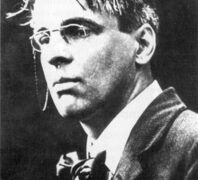In an episode of The Simpsons, Marge receives the latest edition of her “Smothering Mothers” subscription which features an article that asks if her child may be a suckaholic: “Growing up is about giving up everything that makes you happy.” Grandpa agrees, telling Marge that the doctors are warning him off raisins. Homer sees an ad on TV for Nappien, a sleeping pill. He, in typical fashion, jumps at the opportunity to get a good night’s sleep and incontinently ingests the philtre. Nothing. It’s a con, a sugar pill, snake oil? But no. Odd things begin to happen. He makes a domino rally with the family’s supply of videotapes. The drug elicits quotable laments like this: “Aw, I have three kids and no money! Why can’t I have no kids and three money?” Homer’s behaviour becomes even more erratic, though Bart isn’t too concerned: “Why am I sleeping when right next door is every boy’s dream: a fat, suggestible zombie dad?” There follows a zombie montage introduced Homer himself. Hilarity ensues of course. Street hooligans use him as a punchbag; he gives Milhouse a zombie haircut which comprises exclusively of a swathe of number 1 over the right ear. Anyway, my point is obvious: like it or love it, yes, The Simpsons is genius. Take this little interplay: Moe: “Lousy civilians…I wish I could burn ’em all!” Mayor Quimby: “Easy there, Fire Chief Moe.” Like so much else, it looks easy once it’s written....
THE BANKING INQUIRY FARCE by Daniel Dilworth...
posted by Cloud
So, typical Ireland – we made a controversy out of a banking inquiry, where everyone is supposed to be united against the evil bankers! Well, that was until this week, of course, when a Labour politician failed to make it to a meeting which would nominate the Oireachtas members to sit on this inquiry. She failed to make it, and in the end Fianna Fáil got two members on said inquiry. Fine Gael and Labour went ballistic, with Enda Kenny calling it disgraceful, and Ivana Bacik, the Labour leader in the Seanad, saying the whole thing was an “ambush” on the government, as if this was possibly comparable to the Soldiers of Destiny’s famous last ambush against the government. Kenny, in his usual style, demanded Marc MacSharry of Fianna Fáil quit the inquiry or even be removed from it. Happy days for the government, he may have thought, further threatening that the terms of reference for the inquiry wouldn’t be made available until MacSharry departed. There was one hitch. With MacSharry’s refusal to quit, Kenny was banking on his removal. Little legal issues got in the way, such as Kenny being told MacSharry couldn’t be removed until the terms of reference were set. So, in the end, Kenny did what any honourable and noble politician would do; he announced his intention to appoint two Oireachtas members in the government to the inquiry, thus bypassing the previous vote that had been held in the original meeting to decide the nominations for the inquiry. Tempers rose in the subsequent Seanad sitting, with opposition keen to point out that this act was reminiscent of Soviet Russia and one particularly interesting comment being that Hitler himself would’ve been “ashamed” of Kenny’s tactics. Kenny’s nominees needed the approval of...
Yeats’ “Airman”...
posted by Cloud
Yeats’ poetry is very much an historic record of Ireland throughout some of its most troubled years; it’s much more besides however. There is a universal aspect to Yeats’ themes: he concerns himself with unavoidable life challenges like ageing, the role of art, violence and individualism. Regardless of what theme he is exploring, he relies on contrast and symbolism as well as imagery. Thus, there is much to admire thematically as well as in terms of style. There is much in Yeats’ work to engage a student of history. Much of it is contextual rather than informative. An Irish Airman Foresees His Death tells the personal story of one airman whose unique motivation is laid bare to great effect. Yeats intuits Gregory’s visceral response to the war; he is drawn as if by pure instinct not to any nationalistic principles but to the opportunities of battle for a fuller expression of who he is as a man and adventurer: “A lonely impulse of delight/Drove to this tumult in the clouds”. There may have been many such men and as many instincts, but we are shown Gregory and Gregory alone, and his voice is distinct and impressive. His aloofness is to the fore: “Those that I guard I do not hate/Those that I guard I do not love”. These is an extraordinary sense of balance in his tone and while he may seem to have a death wish such an impression is flawed: “I balanced all, brought all to mind”....



